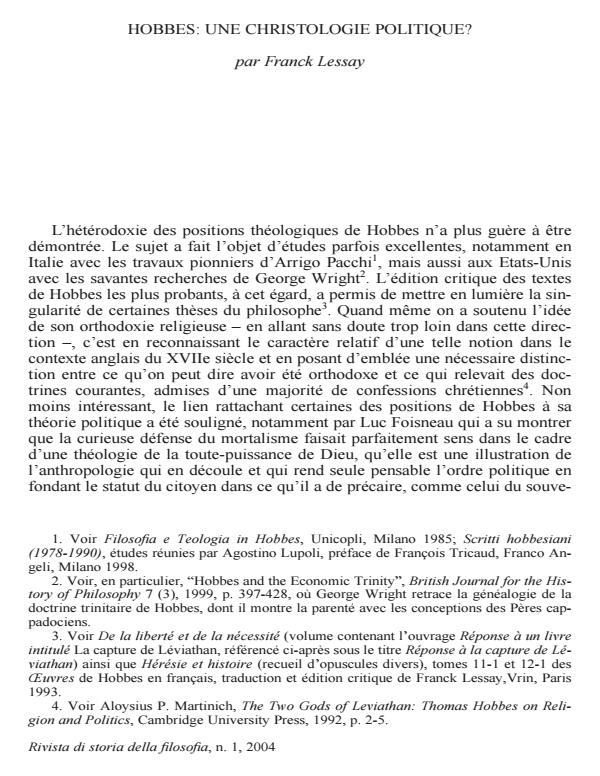Hobbes: une christologie politique?
Titolo Rivista RIVISTA DI STORIA DELLA FILOSOFIA
Autori/Curatori Franck Lessay
Anno di pubblicazione 2004 Fascicolo 2004/1 Lingua Italiano
Numero pagine 22 P. Dimensione file 93 KB
DOI
Il DOI è il codice a barre della proprietà intellettuale: per saperne di più
clicca qui
Qui sotto puoi vedere in anteprima la prima pagina di questo articolo.
Se questo articolo ti interessa, lo puoi acquistare (e scaricare in formato pdf) seguendo le facili indicazioni per acquistare il download credit. Acquista Download Credits per scaricare questo Articolo in formato PDF

FrancoAngeli è membro della Publishers International Linking Association, Inc (PILA)associazione indipendente e non profit per facilitare (attraverso i servizi tecnologici implementati da CrossRef.org) l’accesso degli studiosi ai contenuti digitali nelle pubblicazioni professionali e scientifiche
The striking similarity between the position of Hobbes’s political sovereign on earth now and the position of Christ following His return after the Last Judgment is the final insight of many contained in Franck Lessay’s trenchant essay. Pursuing several lines of analysis into Hobbes’s ecclesiology, Lessay seeks to show its singularity and radicalism vis-à-vis any other contemporary position. The constant attempt to undercut any pretended independence of the church from the civil government is characteristic of Hobbes’s approach, and in this he is far more Erastian certainly than Laud or also Hooker. An extended focus upon Hobbes’s doctrine of the Trinity yields several important insights regarding the central role of the Christ, as Hobbes understood it, as well as the merely commemorative meaning of the sacraments established by Him. As in other articles in this section, Lessay shows important links between Hobbes’s theology and his politics.;
Franck Lessay, Hobbes: une christologie politique? in "RIVISTA DI STORIA DELLA FILOSOFIA" 1/2004, pp , DOI: